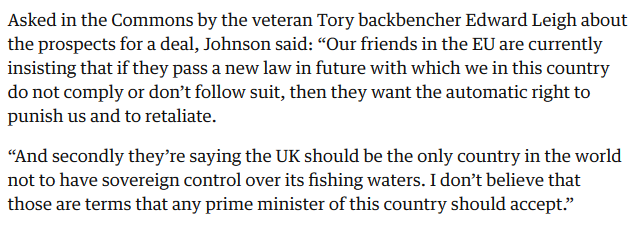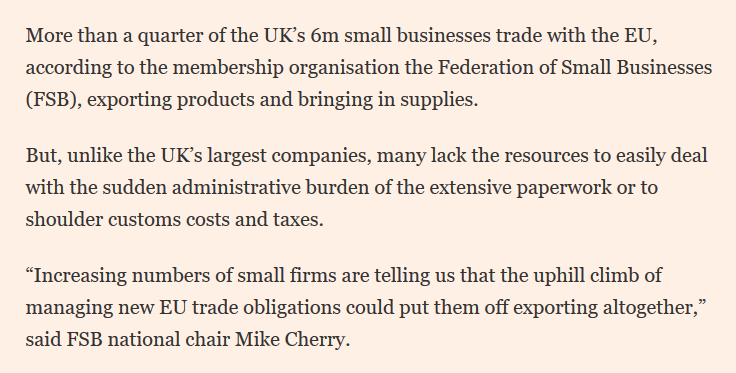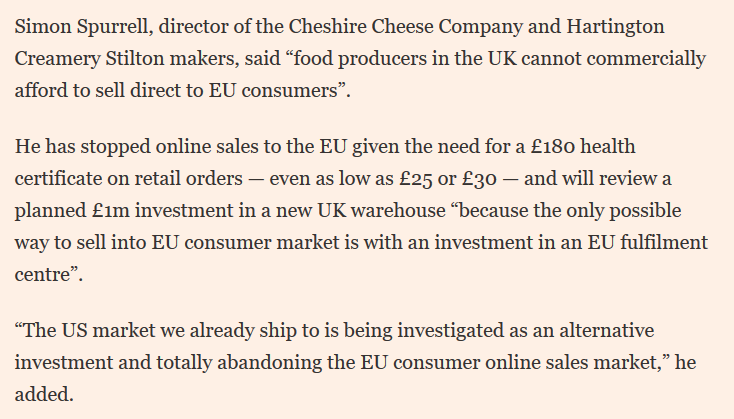How to make sense of the increasing number of UK-EU trade disruption stories?
In short - outside of a single market product checks and people working restrictions are inevitable. And outside a customs union you will have tariffs and / or rules of origin.
Detail ---> 1/
E.g. I attended an event at HoC where we discussed the implications for aerospace of UK leaving EASA. The gov minister said the gov would never do this as they understood the issues.
— Simon Hancock (@simonhancock_uk) January 8, 2021
They then decided to leave without any further consultation with the industry.
More from David Henig
Michael Gove: "Outside the EU, with a good trade deal in place, we can tackle the injustices and inequalities that have held Britain back."
— Jennifer Rankin (@JenniferMerode) December 26, 2020
The UK did not need to leave the EU to tackle injustices and inequalities at home. Not a new point, but true.https://t.co/fE4glUAylc
There has never been level playing field content like this in a trade deal. The idea it is any kind of UK win, when the UK's opening position was no enforceable commitments whatsoever, is ridiculous.
For the lawyers. Night. pic.twitter.com/5XvFMhcaeE
— Sam Lowe (@SamuelMarcLowe) December 25, 2020
The EU can take retaliatory action against the UK if we weaken labour standards, weaken pretty firm climate change targets, unfairly subsidise, or just in general seem to be out of line. There are processes to follow, but it looks like the PM did it again...

Final one for now. Quite how Labour gets itself in such a fuss about whether to support a deal with the strongest labour and environment commitments ever seen in a trade deal is a sign of just how far it hasn't moved on from leaving.
PS well... (sorry DAG). It certainly didn't have a good effect. And I think if we had settled LPF issues with the EU much earlier there is a good chance the conditions would have been far less stringent. By making an issue, we made it much worse.
As a lay person is it fair to say that the \u201cthreat\u201d to break international law in Ireland was possibly a strategic blunder that has now determined the future trajectory of the UK for the next 20 years? I can imagine most countries will study what\u2019s baked into this and replicate?
— Meister 1 (@blueelmacho) December 26, 2020
More from Brexit
London intends to make use of its costly SPS regulatory autonomy. As widely anticipated, first area of divergence expected to take place in the field of Crispr technology for genome editing, area where the UK has long argued for a more liberal stance.https://t.co/btRoxU3saZ
— Emily Rees (@emilyrees_eu) January 7, 2021
Let's start off with: I don't think any trade experts are surprised by this. It is why the TCA did not do much on SPS. It is why the EU did not offer much on SPS. It is why the UK did not ask much on SPS.
But it also shows that the popular slogan "after Brexit we'll have the same standards as before, so why would anything change in trade" was wrong - and worse, it was purposefully trying to stifle a necessary debate.
And this leads me to the next point: I have no issue with changing the rules, I have a massive issue with how it is done. Here's what we should discuss:
The decisive question: What are the standards the UK as a country wants. To inform this debate, we need the following information:


















